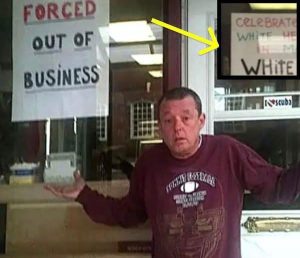Jim Boggess had a deep appreciation for his heritage and wanted to share that sense of pride with the local community. As the owner of a deli in Flemington, New Jersey, he believed he had found the perfect way to express this sentiment. His idea was simple: a handwritten sign displayed prominently on the deli’s front window that read, “CELEBRATE YOUR WHITE HERITAGE IN MARCH, WHITE HISTORY MONTH.” To Boggess, this message was meant to encourage pride in one’s ancestry, much like Black History Month or other cultural heritage celebrations. However, the reception was far from what he had expected.

The sign immediately drew attention, but not the kind Boggess had hoped for. Instead of sparking a positive discussion about heritage, it led to controversy. One of his customers, Bhakti Curtis, was particularly disturbed by it. Curtis, who comes from a mixed-race background, viewed the message as inappropriate and offensive. To him, it seemed to mock Black History Month rather than celebrate white heritage. He also noted that the letter “T” in “WHITE” had been crossed out in a way that reminded him of Ku Klux Klan symbolism, further intensifying his concerns. Feeling compelled to take action, Curtis went to the Flemington Police Department and filed a complaint against Boggess.
Despite Curtis’s concerns, the police did not find any legal wrongdoing in the sign. They determined that it was not explicitly racist or offensive from a legal standpoint. However, the backlash from the community had already begun. Boggess soon found himself at the center of a heated debate. For nearly four days, he was bombarded with questions from customers, reporters, and community members about the sign’s intent and implications. While he insisted that his message was never meant to be divisive, the controversy only escalated. Eventually, he made the decision to remove the sign, hoping it would put an end to the growing outrage.
Unfortunately for Boggess, taking the sign down did not undo the damage. Word of the controversy had already spread throughout the community, and the impact on his business was severe. Many customers who once frequented the deli now chose to stay away. Sales plummeted, and financial difficulties mounted. Within a month of the incident, Boggess was forced to make a heartbreaking decision—he had to shut down his deli. The business he had worked so hard to build was no longer sustainable.
Ironically, despite the turmoil, Boggess and Curtis had come to an understanding. They had a conversation about the sign, and in a show of goodwill, they even took a photograph together, shaking hands. The photo was meant to symbolize reconciliation and mutual respect, but it was not enough to undo the damage done to the deli’s reputation.
With his business in ruins, Boggess turned to the community for help. He launched a GoFundMe campaign titled “Jimbo’s White History Sign Gone Bad” in an effort to recover from his financial losses. In his campaign description, he shared his perspective on the situation and expressed his frustration over the backlash he had faced.
The campaign read:
*”If you haven’t heard of this story and you want to read about it, just Google Flemington white history or go on YouTube and search White History Month. Anyway, it went crazy for four days and then I had to take the sign down for various reasons. It was only supposed to be a white thing, but people read more into it than that.
I don’t think I deserve this just because I wanted to be proud of being white and be able to celebrate my heritage like everyone else does. If you read this, please leave a comment and what state you’re from so I can see where my support is coming from.
Thank you for all the support, and I WILL stay strong and hope to find a job.
Thank you,
Jimbo Boggess.”*
Boggess’s campaign drew mixed reactions. Some people sympathized with his situation, believing that he had been unfairly targeted for expressing pride in his heritage. Supporters from across the country sent him letters, messages, and words of encouragement. Many agreed with his sentiment, arguing that every racial and ethnic group should have the right to celebrate its history and culture.
However, others were less sympathetic. Critics argued that while cultural pride is important, the wording of the sign was insensitive and poorly timed. Given the history of racial tensions in America, they felt that his message came across as a response to Black History Month rather than a standalone celebration of white heritage. To them, it seemed exclusionary rather than inclusive, and the backlash was not unwarranted.
Despite receiving messages of support, Boggess struggled to recover. His business was already gone, and his financial situation remained dire. The controversy had cost him more than just his deli—it had taken away what he considered to be his American dream.
This incident serves as a stark reminder of the power of words and the impact they can have in a diverse society. While Boggess’s intent may not have been to offend, the way his message was received ultimately shaped the outcome. It highlights the complexities of discussions surrounding race, heritage, and identity in the United States.
For Boggess, the lesson was a painful one. He had hoped to unite people in celebrating heritage, but instead, he found himself at the center of a debate about race and representation. Whether his message was misunderstood or simply ill-conceived, the consequences were undeniable.
As for Curtis, he never sought to ruin Boggess’s business. His complaint stemmed from his personal feelings about the sign, and he ultimately made peace with Boggess. But by the time their differences were resolved, it was too late to save the deli.
Boggess’s story is a cautionary tale about the importance of considering different perspectives before making public statements. What one person sees as a harmless expression of pride, another might perceive as offensive or exclusionary. In a world where social media and rapid communication can turn local events into national controversies overnight, understanding the potential impact of one’s words and actions has never been more crucial.
In the end, Boggess lost more than just a business—he lost a dream that he had poured his heart into. And for better or worse, his story remains a reminder of how deeply personal and complex discussions about race and heritage can be in America today.





